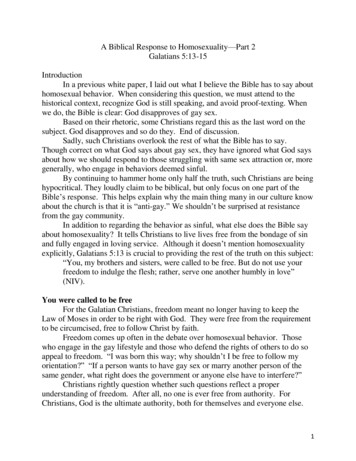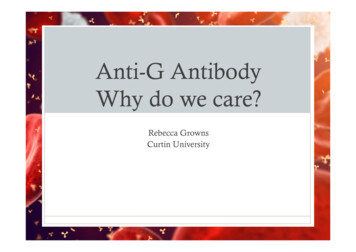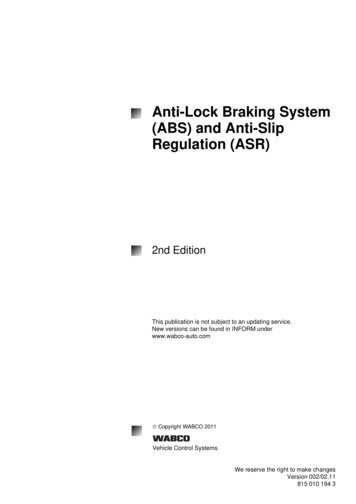
Transcription
A Biblical Response to Homosexuality—Part 2Galatians 5:13-15IntroductionIn a previous white paper, I laid out what I believe the Bible has to say abouthomosexual behavior. When considering this question, we must attend to thehistorical context, recognize God is still speaking, and avoid proof-texting. Whenwe do, the Bible is clear: God disapproves of gay sex.Based on their rhetoric, some Christians regard this as the last word on thesubject. God disapproves and so do they. End of discussion.Sadly, such Christians overlook the rest of what the Bible has to say.Though correct on what God says about gay sex, they have ignored what God saysabout how we should respond to those struggling with same sex attraction or, moregenerally, who engage in behaviors deemed sinful.By continuing to hammer home only half the truth, such Christians are beinghypocritical. They loudly claim to be biblical, but only focus on one part of theBible’s response. This helps explain why the main thing many in our culture knowabout the church is that it is “anti-gay.” We shouldn’t be surprised at resistancefrom the gay community.In addition to regarding the behavior as sinful, what else does the Bible sayabout homosexuality? It tells Christians to live lives free from the bondage of sinand fully engaged in loving service. Although it doesn’t mention homosexualityexplicitly, Galatians 5:13 is crucial to providing the rest of the truth on this subject:“You, my brothers and sisters, were called to be free. But do not use yourfreedom to indulge the flesh; rather, serve one another humbly in love”(NIV).You were called to be freeFor the Galatian Christians, freedom meant no longer having to keep theLaw of Moses in order to be right with God. They were free from the requirementto be circumcised, free to follow Christ by faith.Freedom comes up often in the debate over homosexual behavior. Thosewho engage in the gay lifestyle and those who defend the rights of others to do soappeal to freedom. “I was born this way; why shouldn’t I be free to follow myorientation?” “If a person wants to have gay sex or marry another person of thesame gender, what right does the government or anyone else have to interfere?”Christians rightly question whether such questions reflect a properunderstanding of freedom. After all, no one is ever free from authority. ForChristians, God is the ultimate authority, both for themselves and everyone else.1
They can’t help but observe that while God’s authority can be rejected, theconsequences of that rejection are unavoidable.Even if I reject all external authority—divine and human—I am not free;someone is still calling the shots. That “someone” might be culture, my peergroup, myself, or some combination, but the result is the same: I’ve committedmyself to an authority which lacks the objectivity and perspective provided in theBible, God’s written Word. I cannot say that my action has no harmfulconsequences; the best I can say is that from where I stand I see no harm in whatI’m doing.Christians also point out there is no such a thing as freedom fromconsequences. When we choose to do something, we have also chosen theconsequences that accompany that action. This constitutes a moral law no lessbinding than the laws of nature.While one is free to engage in a certain type of behavior, one isn’t free fromthe consequences of that behavior. While we can’t say what all thoseconsequences might be, we believe that when God forbids a behavior, as he doeswith gay sex, He does so to spare us harm.A culture is free to legitimize any behavior, but is not free from theconsequences of that decision. Those justices dissenting from the 2015 USSupreme Court decision legalizing gay marriage made this point. Justice Alitowrote, “At present, no one—including social scientists, philosophers, andhistorians—can predict with any certainty what the long-term ramifications ofwidespread acceptance of same-sex marriage will be” (as cited in Emma Green,“The Conservative Split on the Meaning of Marriage, The Atlantic, July 1, 2015,www.theatlantic.com, accessed October 8, 2016).While Christians may have a better understanding of freedom, we are notalways successful at living up to our calling to be free. Like the GalatianChristians, we seem inclined to fall back into a legalistic understanding ofsalvation. While not tempted to submit myself to the Law of Moses, I am enticedby the Law of Steve. My opinion of what a Christian should look or act like orhow they should worship is too often elevated to a level that should only beoccupied by God’s law.One of the human laws enslaving many Christians today could be called theLaw of Limited Grace. Many have come to believe, erroneously, that while God’sgrace can pardon them from the guilt of past and present sin, it cannot free themfrom the power of sin. They feel bound to continue sinning daily in thought, word,and deed. God’s grace is seen as limited to removing the consequences of sins Ican’t help committing. It just isn’t strong enough to help me not commit them.Apparently the Galatians were also in danger of bondage to the Law ofLimited Grace. Paul had to remind them that, “Those who belong to Christ Jesus2
have crucified the flesh with its passions and desires. Since we live by the Spirit,let us keep in step with the Spirit” (Gal 5:24-25).God’s grace, says Paul, has “crucified the flesh,” that is, has killed my natureand made possible a new nature, one that lives “by the Spirit” and can “keep instep with the Spirit.” When it comes to overcoming sin, there is no limit to God’sgrace; it can accomplish much more than we imagine.While right to remind others of freedom’s true definition, to be biblical,Christians must also live out the full expression of freedom made possible byChrist. To preach freedom without living freely is worse than hypocrisy, for itabdicates the very example others so desperately need.Do not use your freedom to indulge the fleshPaul reminds the Galatian Christians that while free from the Law of Moses,they were not free from God’s moral law. The Galatians may have had troublegetting Paul’s point, but many of today’s Christians have learned this lesson all toowell. At least they’re good at criticizing others, such as those who practice gay sex,of indulging the flesh.As I’ve already made clear, Christians are not wrong to hold this view norare we wrong to point out what God’s word has to say about sinning. We must,however, be just as ready to apply the same behavioral standard to ourselves as wedo to others. When Jesus said we mustn’t try to remove a splinter from another’seye if we have a log in our own, He wasn’t excusing splinters. He was restrictingwho had the right to help remove them to those who could do so most effectively.Every single New Testament reference to homosexual behavior is foundamong a list of sins. Christians have been criticized—rightly—for focusing on oneentry in the list and ignoring the others. What others? The list Paul provides inGalatians 5:19-21 contains the usual suspects:“19 The acts of the flesh are obvious: sexual immorality, impurity anddebauchery; 20 idolatry and witchcraft; hatred, discord, jealousy, fits of rage,selfish ambition, dissensions, factions 21 and envy; drunkenness, orgies, andthe like. I warn you, as I did before, that those who live like this will notinherit the kingdom of God.”Even the casual observer of today’s church will have no trouble findingexamples of the above, especially of hatred, discord, jealousy, rage, selfishambition, dissensions, and factions. Such divisions represent the scourge ofcontemporary evangelicalism. Are we as quick to criticize these sins as “sexualimmorality”?But “sexual sins are the worst kinds of sin.” I disagree. The seriousness of asin correlates with the measure of reason required to produce it. Even parents3
understand that childhood disobedience is more serious when premeditated andless serious when spontaneous.Generally speaking, it takes more thought to commit the sins of idolatry,pride, selfish ambition, divisiveness and hatred, than to commit sexual immorality.At least in the heat of the moment, sexual sins are fueled by something other thanreason, something that has a way of shouting down rational objections. This is whythey’re called sins of passion. Paul warns the Corinthians to flee sexualimmorality (1 Corinthians 6:18), not because it is the most serious, but because it isthe most likely to overwhelm us.Christians are being biblical when they warn others to avoid sinning, butonly when they themselves abstain from sin. We are not wrong to condemn sin inothers, so long as we are just as rigorous in applying the same standard toourselves.Serve one another humbly in loveHere is the crux of the matter when it comes to a biblical response tohomosexuality. Even if we have a right definition of freedom and even if we avoidsinning, we must also “serve one another humbly in love,” if our response is to bebiblical.Someone might object, “But we are loving. We hate the sin but love thesinner.” I have news for you: the world isn’t feeling the love. According to recentresearch, when the vast majority of Christians and non-Christians want to describethe church, they call it “anti-homosexual.” What is coming across is not love, but“disdain” for those who are gay (Lee, Torn 2-3).Our problem is not our stance on homosexuality. We oppose this lifestylebecause the Bible opposes it. We are right to be concerned when society drives atbreakneck speed into a dense fog, with no apparent regard for what the future mayhold.Our message may be right, but we are not as loving as we think we are.Why? Because we don’t express an essential element of love, we don’t “serve oneanother humbly in love” (v. 13). We need to do better at being known for humblelove.We must humble ourselves, first, for our lack of understanding. We’veassumed same sex attraction is just a matter of choice when its causes are littleknown. Nature and nurture both play a role, but no one can say with certaintywhat their role might be.We must humble ourselves for wrongly assuming that those who support agay lifestyle do so out of disdain for morality. There are other very good reasonswhy people support gay rights, such as concern for the mental health of thosestruggling with same sex attraction, some of those struggles ending in suicide.4
People support gay rights because they value authenticity. They reason thatthose who see themselves as gay should have the right to act consistent with theirself-understanding. Some support gay rights as an act of resistance against whatthey see as untoward government intrusion. If we’re humble, we’ll be aware thatthose on the other side of this issue may have motives we can affirm.We must humble ourselves, second, for how we’ve reacted. Some of us havelived by a double standard, condemning others’ sins but neglecting our own.We’ve not been good listeners, considering ourselves righteous for refusing toengage with those who differ from us. We’ve called our response “righteousindignation,” when it may have been only “fear of the other.” When some of ourown have honestly shared their same sex attraction, we have tended to treat themlike enemies, not family. If we’re humble, we’ll admit we’ve responded poorly.We must humble ourselves, third, because we are partly to blame for theway things are. Christians have not celebrated marriage as we should. We havenot worked out a clear understanding of its timeless purpose. Instead we’veoffered only the uninspired and uninspiring reason given by everyone else,“because we love each other.” How can we say we’ve honored marriage when wedivorce as much as the unchurched and remain silent about the skyrocketing ratesof cohabitation?One study revealed that sexual abuse is one of the causes for as many as15% of people adopting a gay lifestyle. Churches, both Protestant and Catholic,failed to take a strong stand against sexual abuse until we were forced to do so byculture.By failing to respond as we should, we’ve made it more difficult for ourchildren to remain in the church. They are being forced to choose, says DebraHirsch, “between what appears to be a bad-tempered church (which their parentsrepresent) and their LGBT friends” (Hirsch, Redeeming Sex, 136). For these andother failures, we Christians must humble ourselves.True love is not only humble, it serves others. If we were going overseas towork as a missionary, we would be very conscious that we were there to serve, notto be served. We would bend over backward to avoid offense. Among thosealready offended, we would bend even further.I suggest we think of the encounter with those supporting gay rights ascross-cultural. Let’s use terms our conversation partners consider inoffensive,such as “gay” or LBGTQ (lesbian, bi-sexual, gay, transgender, queer).We should never use the expression, “hate the sin but love the sinner.” Wemight understand what we mean by it, but the phrase is highly despised in theLBGTQ community. Let’s avoid talk of reparative therapy as a simple solution.While such therapy can bring some relief, it is not the panacea so often promoted.It is better to completely avoid a focus on causation and how to change.5
If we were going overseas to serve as a missionary, we would prepare aswell as possible. Loving service to the gay community requires no less. We needto know the difference between same sex attraction, homosexual orientation, andgay identity, and make sure we and our conversation partner are talking about thesame thing.Good conversation partners work hard to develop trust. If any try to bait usinto an argument, we won’t bite, knowing it will not bring clarity. Through it all,we will practice what someone has called “convicted civility.”We cross the cultural boundary hoping to persuade another to the rightnessof our position. In the end, however, we must all finally leave our conversationpartner to his or her own conscience.John Wesley could be very direct, even confrontational, in his speaking andwriting. Yet Wesley was convinced of the importance of respecting the conscienceof others. In the midst of controversy, Wesley wrote,if you love God, you will love your brother also; you will be ready to laydown your life for his sake; so far from any desire to take away his life, orhurt a hair of his head. You will then leave his conscience uncontrolled; youwill no more think of forcing him into your own opinions, as neither can heforce you to judge by his conscience. But each shall “give an account ofhimself to God.”It is true, if his conscience be misinformed, you should endeavor toinform him better. But whatever you do, let it be done in charity, in love andmeekness of wisdom. Be zealous for God; but remember, that “the wrath ofman worketh not the righteousness of God;” that angry zeal, thoughopposing sin, is the servant of sin; that true zeal is only the flame of love(Wesley, “A Word to a Protestant,” XI: 191).This is what it looks like when we humbly and lovingly serve those who areoutside the church. But what about those who struggle over this issue within thechurch? As part of a ministry of compassionate pastoral care, churches shoulddevelop support groups for parents, for spouses, and for those questioning theirsexuality and gender. “In an atmosphere of grace,” asks Mark Yarhouse, “can wecome alongside people who are navigating this difficult terrain?” (Yarhouse,Gender 159).Yarhouse speaks of “sincere strugglers,” Christ-followers who seek to beloyal to Jesus while wrestling with their same sex attraction. He encourages us tohelp sincere strugglers see that their impulses are not infallible. They must learnthat their true identity is more than sexual, but rests in being God’s beloved imagebearers.We must help them understand a better definition of freedom. In the wordsof George MacDonald, “A free will is not the liberty to do whatever one likes, but6
the power of doing whatever one sees ought to be done, even in the face ofotherwise overwhelming impulse.The road our brothers and sisters are traveling is not an easy one, nor is italways a quick trip. We must stick with them as they persevere in what may be alife-long condition.The same is true for those struggling with issues of gender incongruence.These are not likely rebels seeking to bust the binary of male and female and usherin a genderless society. More likely, they are just people who want to find peace intheir own skin.The church should provide a loving environment for these who struggle withtheir sexuality and gender. To humbly serve means welcoming such people,allowing them to belong because they believe, giving them time to become whatthey and all other Christians were meant to be.Our churches should be centered sets rather than bounded sets. DebraHirsch illustrates the difference with a story from her native Australia. A touristasked the farmer how he kept his sheep together without fences. The farmerreplied that fences are unnecessary if you dig wells. Having water, the sheep don'twander (Hirsch, Redeeming Sex, 193).Instead of a bounded set with fences, our churches should be centered sets.These have a strong, well-defined center, but are permeable at the edges. Jesus isthe center of this set, the water near which the sheep want to stay.Our churches should “lead with embrace, not theology” (Hirsch, RedeemingSex, 145). They should welcome all people, seeing them as image bearers first,and only then as sinners in need of salvation. Acceptance should precederepentance. This kind of church sees its role as leading people to Christ who willlead them into the church. The church’s responsibility is to then walk with themon the path toward holiness.This kind of church leans toward grace, practicing what Hirsch calls“generous spaciousness” (Redeeming Sex, 132). After all, if “God’s kindness isintended to lead [us] to repentance” (Romans 2:4), perhaps He wants to accomplishthe same result from our kindness.Such churches avoid gay bashing and “preaching to the choir.” They areplaces where the truth can be known and discovered, whether God chooses toreveal it through the Bible or science. When it comes to facilities, a church likethis is quick to install a family bathroom rather than force someone to leave thefellowship.Churches that love with humble service will devote themselves to addressinga biblical view of personhood, sexuality, marriage, and holiness. Why includeholiness in this list? Because it is the crucial missing piece. As I’ve researched7
this topic, I have found so many disparate voices calling for less preaching againsthomosexuality and more preaching on holiness.Little wonder. Those struggling with same sex attraction and genderdysphoria are being confronted with the question of what makes them who theyare. Holiness reminds all of us that we are more than our sexuality or gender.Each of us is made in God’s image and we will only find our true fulfillment inHim. As Yarhouse reminds us, holiness steers those who struggle, not towardheterosexuality, but toward Christ-likeness (Homosexuality, 165).Holiness is also essential for those of us seeking to speak truth into thisissue. As Wesley reminds us, holiness is love for God and humanity. Such lovefinds perfect freedom in surrender to God. Those who love God refuse to live bytheir sinful nature, but live by the Spirit. Out of the holy heart comes the kind ofloving humble service that steps across the street to engage with the Other in thename of God. Only a holy heart can tell the whole truth about homosexuality.Telling the whole truth is needed now more than ever. By only sharing partof the Bible’s message, we’ve made matters worse. We must not shy away fromspeaking of God’s disapproval of gay sex, even if this makes some unhappy. Atthe same time and with equal conviction, we must speak of the freedom to liveabove our natural state, and we must back up our words with our example. Oursmust be lives of humble service, expressing the holy love that is the world’s besthope.Suggested ResourcesDebra Hirsch, Redeeming Sex: Naked Conversations about Sexuality andSpirituality. (Downers Grove, Ill.: IVP, 2015).Justin Lee, Torn: Rescuing the Gospel from the Gays-vs.-Christians Debate. (NewYork: Jericho Books, 2012).Andrew Marin, Love is an Orientation: Elevating the Conversation with the GayCommunity. (Downers Grove, Ill.: IVP, 2009).Jenell Williams Paris, The End of Sexual Identity: Why Sex is Too Important toDefine Who We Are. (Downers Grove, Ill.: IVP, 2011).Mark A. Yarhouse, Homosexuality and the Christian: A Guide for Parents,Pastors, and Friends. (Minneapolis: Bethany House, 2010).8
Mark A. Yarhouse, Understanding Gender Dysphoria: Navigating TransgenderIssues in a Changing Culture. (Downers Grove, Ill.: IVP, 2015).John Wesley, “A Word to a Protestant,” The Works of John Wesley, Third Edition,Volume XI, (Peabody, Mass.: Hendrickson Publishers, 1984).Website from the US Conference of Catholic Bishops: ity/homosexuality/always-our-children.cfm9
grace can pardon them from the guilt of past and present sin, it cannot free them from the power of sin. They feel bound to continue sinning daily in thought, word, and deed. God's grace is seen as limited to removing the consequences of sins I can't help committing. It just isn't strong enough to help me not commit them.










